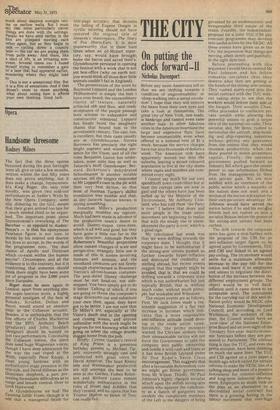Handsome threesome
Rodney Milnes
The fact that the three operas 'mounted during the past fortnight Were all, give or take a few months, written within the last fifty years does not prove, anything, but it does make a change. Szymonowski's King Roger, the only true novelty, was given two sold-out performances at Sadler's Wells by the New Opera Company; some silly dithering by the GLC meant that their grant arrived too late for a much needed third to be organised. The important point about Szymonowski's reworking of The Bacchae — as opposed to Auden/ Henze's — is that his eponymous Pentheus figure is not torn to shreds by his nearest and dearest but lives to accept, in the words of the programme note, "the dual claims of Apollo and Dionysos which co-exist within the human Psyche". Circurrispice, and all the evidence is to the contrary, but it is comforting that someone should think there might have been some Jot of progress in the 2,000 years since Euripides.
Roger must be seen again in London; apart from anything else, the super-luscious score, a highly personal amalgam of the best oi Rimsky, Scriabin, Delius and Ravel, would sound an absolute treat in the Coliseum acoustic. Besides, it is unthinkable that the fine efforts of Charles Mackerras and the RPO, Anthony Besch (Producer) and John Stoddart (designer) should be wasted on just two performances. Continuing the Coliseum notion, the piece does need huge Wagnerian voices, though I have deep admiration for the way the cast coped at the Wells, especially Peter Knapp, a clean young baritone with an authoritative stage presence in the title-role, and David Hillman as the Dionysian shepherd, a part presenting formidable difficulties as to range and breath control. Over to Lord Harewood.
At Glyndebourne we had The Cunning Little Vixen, though it is odd that a managerial fetish for title-page accuracy that dictates the billing of Eugene Onegin in cyrillic lettering should not have restored the original title of Janacek's masterpiece, The Story of Fox Sharp-Ears. It is most praiseworthy that in these hard times when an all-Mozart repertory, say, would have brought, home the bacon and saved their's, Glyndebourne persisted in opening the festival with a work that is not yet box-office (why on earth not:. you would think all those dear little animals couldn't fail in England).
The presentation of the score by Raymond Leppard and the London Philharmonic is simply the best I have ever heard; the extraordinary clarity of texture, naturally achieved ebb and flow, and ready acceptance of the purple passage bore witness to exhaustive and constructive rehearsal. Leppard has finally burst the imaginary chains that bound him to the seventeenth century. The cast, too, is excellent, but then casts usually are at Glyndebourne. Norma Burrowes has precisely the right bright soprano and winning presence for the Vixen, and of all the roles Benjamin Luxon has undertaken, none suits him so well as Janacek's bluff Gamekeeper. Bernard Dickerson's dehydrated Schoolmaster is another notable success. All the singers responded to Mr Leppard's care in the pit with their very best diction, so that most of Norman Tucker's skilful translation was audible and that, as any Janacek fancier knows, is saying something.
Jonathan Miller's production marginally modifies my rapture. Much had been made in advance of the production team's desire to avoid Disney-esque twee-ness, which is all well and good, but they have gone a little too far in the other direction. Although Patrick Robertson's beautiful projections allow instant changes of scale and perspective, strangely little use is made of this in scenes involving humans and animals, and the woodland creatures are not firmly enough characterised in Rosemary Vercoe's all-too-human costumes. The post-dated Disney challenge must be met head-on, not sidestepped. You have simply got to do it better. Talking of which, if you are going to throw the composer's stage directions out and substitute your own then, again, they have got to be better. I am not sure that Dr Miller's are, especially at the Vixen's death and in the opening and closing scenes, and anyone unfamiliar with the work might be forgiven for not knowing what was going on when the village drunks stagger home from the pub.
Briefly, Covent Garden's revival of King Priam is a generous birthday present to Michael Tip-pett: extremely strongly cast and conducted with great verve by David Atherton. The Sean Kenny sets and Wanamaker production are still amongst the best to be seen at the Garden, Forbes Robinson and Richard Lewis remain wonderfully authoritative in the roles of Priam and Achilles that they created, and no opera that has Yvonne Minton as Helen of Troy can really fail.


























 Previous page
Previous page